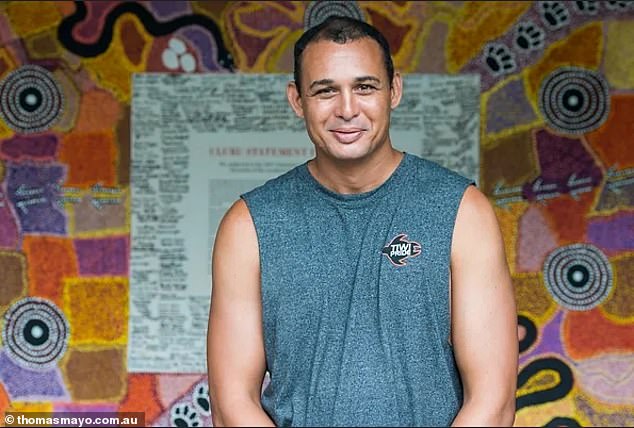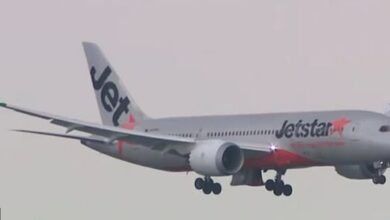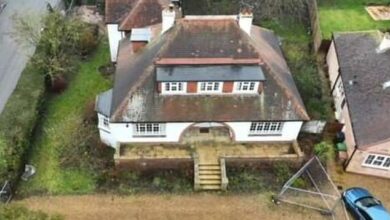Voice Yes campaigner Thomas Mayo shares single text that ‘proves some Australians are horribly racist’ – and debunks myths about Aboriginal people

Campaigner Thomas Mayo has shared text message evidence that “some Australians are horribly racist” in his new book, a guide of sorts for how Australians of all backgrounds can tackle racial injustice.
In Always was, always will bethe controversial proponent of the ‘Yes’ vote in last year’s failed referendum also responds candidly to the ‘lies about indigenous peoples’ he often encounters in society.
Last October, every Australian state voted against the proposal to include an Indigenous Peoples Advisory Commission in the constitution, despite the support of Prime Minister Anthony Albanese.
In the book, Mayo, a trade unionist, said he believed most No voters actually wanted Aboriginal children to have a better future. But he acknowledged that the No campaign’s slogan of “if you don’t know, vote No” was effective in influencing voters.
Mayo responded by saying that activists must tackle myths about indigenous peoples head-on.
In the book, the activist refutes such claims in detail, including that Aboriginal people will “take your backyard”, that “they don’t want to work” and that the claim that taxpayers spend “$30 billion on Indigenous people every year” is false.

Controversial ‘Yes’ referendum campaigner for The Voice, Thomas Mayo, has revealed a message in his new book that he says proves ‘some Australians really are racist’, and also debunks myths about Aboriginal people.

The racist text claimed that while the late actor David Gulpilil (above) was a ‘real’ Aboriginal, Mayo was merely a ‘byproduct’ of Indigenous and white people
But one of the most striking aspects of the book is an anonymous, insulting message the campaigner received after last year’s election, which he said “removed any doubt about how terribly racist some Australians are.”
The disturbing text focused on the colour of Mayo’s skin – saying: ‘I know what an Australian Aboriginal looks like, and that’s not you. David Gulpilil yes, but not you.’
The late David Gulpilil was an indigenous actor.
Mayo said he wouldn’t normally share such a post – which uses offensive language about “full-blooded Aboriginals” and “wannabes” – but said he had experienced worse and it was important to share this as an example of racism.
Below are some of the myths Mayo presents in his book, and some of his responses. Mayo said the list is “not definitive” but “could be a useful starting point.”
1. ‘Would always have been invaded’

Mayo says that no matter who colonized Australia, Europeans were not more intelligent because they out-competed the Aboriginals. Above is a sketch of Captain Cook landing at Botany Bay, 1770
Mayo wrote that it would not matter much whether the French, the Dutch or some other colonial power had invaded the country if the British Empire had not done so.
He argued that the fact that the First Nations were less armed than the Europeans does not justify what happened next.
He notes that Aboriginal people were already able to live peacefully side by side, and that their conflicts were less bloody than those elsewhere in the world.
2. ‘They’re taking over your backyard’

Warnings about indigenous people taking white people’s homes and property is ‘scaremongering’ and ‘has never happened and never will happen’. Above, girls at Pukatja Roadhouse, 450km south of Alice Springs
Mayo wrote that whenever Indigenous peoples are on the cusp of positive change, “the same old warnings” come up.
These mean that Australians are at risk of losing their property and privileges, particularly as Aboriginal people take possession of their homes and land.
The book described how the same criticism has been heard for decades in political battles involving indigenous peoples, for example in lawsuits over land rights, equal wages and property rights of indigenous peoples.
He said the warnings about lost backyards and separate governments “never happened and never will happen.”
3. ‘$30 billion is spent annually on half a million indigenous people’

That $30 billion a year is spent on Indigenous programs in Mayo is ‘a lie’ and was repeated by Warren Mundine (above right) and then Tony Abbott during The Voice’s ‘No’ vote campaign
According to Mayo, the actual amount spent annually on Indigenous programs is around $6 billion. However, there is a false claim that $30 billion is spent annually on the 500,000 Indigenous Australians, including former Prime Minister Tony Abbott.
Mayo said he heard the number, which was circulated by the Voice No campaign, regularly. He called it a damaging lie.
‘The Productivity Commission estimated that around $30 billion was spent on Indigenous services in 2012-13. However, that total included mainstream services that all Australians have access to, such as defence funding, foreign aid, schools and health.’
Only a small portion of that $6 billion reaches communities, he argued.
4. Who is a ‘real Aboriginal’?
“It is not up to non-Indigenous people to determine who is and who is not Indigenous,” Mayo wrote.
He noted that there is a formal process for determining who is Indigenous in Australia, which involves three criteria.
This means that you are of Aboriginal or Torres Strait Islander descent, identify as such and are accepted as such by the community in which you live or work.
5. ‘Native people don’t want to work’
Mayo wrote that this is completely incorrect and racist.
Aboriginal and Torres Strait Islander people work and pay taxes like other Australians, but at the same time face prejudice, health problems and poverty.
The fact that more and more indigenous people are unemployed and dependent on benefits is a structural problem, and not a matter of race or culture.
Always Was Always Will Be, by Thomas Mayo is published by Hardie Grant

Thomas Mayo’s new book aims to provide a guide to how ‘the campaign for peace and justice for indigenous peoples continues after the referendum is lost’.




